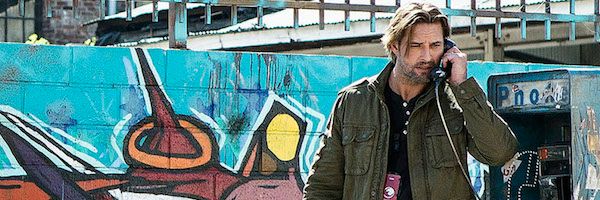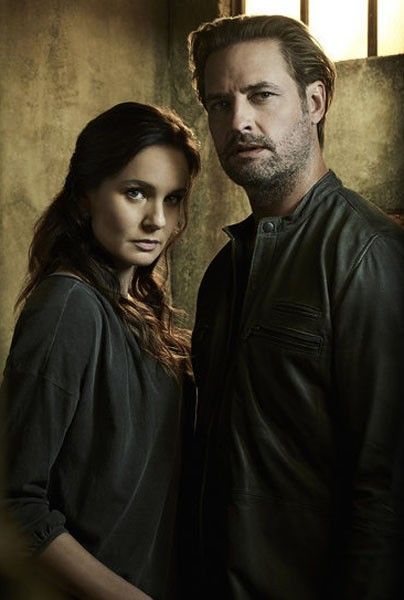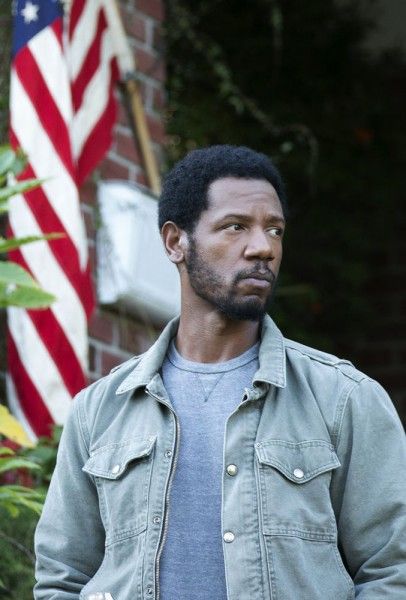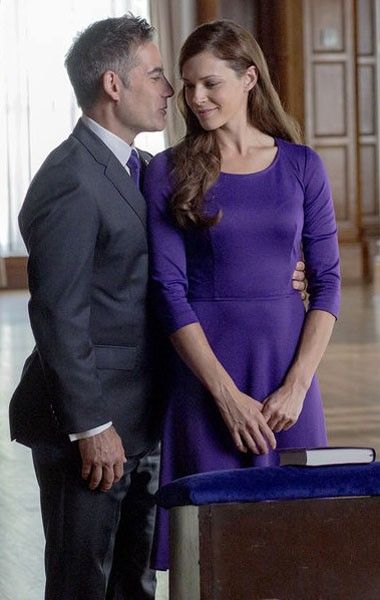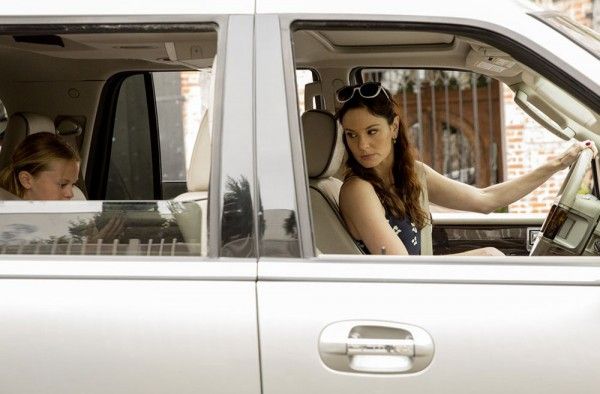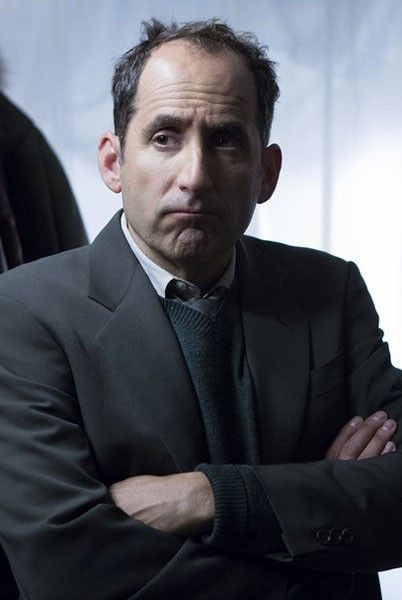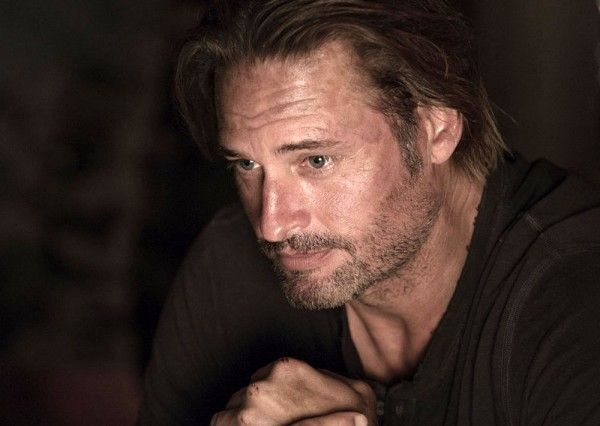From executive producers Carlton Cuse and Ryan Condal, the USA Network series Colony is back for Season 2, with alien intelligence still in control of a near-future Los Angeles. Will (Josh Holloway) has been cooperating with the Collaborators, in an attempt to reunite his family, while his wife Katie (Sarah Wayne Callies), has been exposed as someone working with the Resistance. Now firmly on opposite sides of the battle, Will and Katie must decide just what it is that they’re fighting for and whether the cost is worth it.
Back in August, Collider (along with a handful of other media outlets) was invited to the set of the popular sci-fi drama series to hang out, watch filming and chat with co-stars Josh Holloway, Sarah Wayne Callies and showrunner Ryan Condal about what fans can expect from the second season. During the interview, they talked about how engaged the audience has been, seeing more of the Los Angeles Colony, the new leadership, Will and Katie’s dynamic, how things are getting even darker, delving much further into the sci-fi aspects of the story, new characters that will play a role, expanding to 13 episodes, and that they know where they’re headed, for their eventual endpoint. Be aware that there are some spoilers discussed.
Question: What’s it been like, coming back for Season 2, after completing an entire season?
JOSH HOLLOWAY: It’s amazing! First of all, we got to come back, so that’s good news. That means people like us. What’s been my experience is that the audience is very engaged, and people are watching and following the story, which is exciting. And the scripts have elevated, in my opinion. They’re really dialed in. The show is unfolding, so it’s getting bigger.
SARAH WAYNE CALLIES: A lot of Season 1 was experimental. It was a different direction for USA, it was the first TV show for Legendary, and we were finding our feet. I think what we really got a chance to learn was what works, what doesn’t, and what we love about it. The things that I fell in love with about the show, all grew in Season 2. And I think we got more latitude. All of the bosses went, “Okay, take the reigns and take the gloves off.” It’s a darker season, by far. In my opinion, the first four scripts of this season are the best four scripts of the show, so far. I think they’re sensational.
Will is spending the first three episodes this season in Santa Monica. What sort of trouble will he be getting into while he’s there?
HOLLOWAY: Pretty much all the trouble one might find in Santa Monica. There’s a lot going on, in the first three episodes. This is the first time we’re seeing Santa Monica, so I can’t really give away what that world is going to be, except to say that it’s tough going over there. He’s having to use all of his skills to navigate not only finding Charlie, but what it’s like over there.
Is getting back going to be a struggle, now that there’s new leadership?
HOLLOWAY: You can assume that it will be difficult for him to get back, yes. That’s definitely part of the journey.
What’s the dynamic between Will and Katie like now?
HOLLOWAY: It’s tough going.
CALLIES: I think they’re two people that have equally correct incompatible positions. Under the best of circumstances, this would be a challenge. When we come together, there’s a lot of information that the other person doesn’t know. Everything that we’re going through becomes very subsumed to the needs of the children and their journey. We both came out of the end of last season realizing the biggest mistake we both made was to take our eyes off the ball of our kids, and that refocuses both of us.
HOLLOWAY: And our relationship is taking a back seat out of necessity. It’s there, but we have to survive and deal with the situation of our children. We will or will not bridge our relationship. That’s the journey, at this moment.
How have things evolved with the Occupation and Will’s place in it?
HOLLOWAY: Things have changed, when Will comes back. It’s a completely different office and a completely different environment. He has to do what he has to do to try to get the family back together. That’s the rules of the game right now.
In what ways is this season darker?
CALLIES: Honestly, I’d almost say all of them. Taking our eyes off the ball of our kids and refocusing on them, one of the ways that starts is with our daughter and her intellectual life. It’s darker ideologically. The fronts on which we’re fighting expand. The world looks darker because Snyder lost his job and the next guy isn’t as nice.
HOLLOWAY: It’s the nature of this type of situation. It gets worse before it gets better.
CALLIES: Dictatorships don’t usually get better.
HOLLOWAY: We’re delving deeper into what this is and what being under this suppression really is.
RYAN CONDAL: It’s the nature of extremes. You have an extreme change in balance and a military occupation, and in order to maintain order throughout that occupation, you have a more extreme form of law enforcement and government than everybody is used to. And then, that results in a resistance movement, and they counter that resistance movement with greater extremity. And then, that leads to more extreme versions of the resistance movement. It’s increasing battles of extremism. When the Wall finally came down, the worst days in East Germany were just before then. Under Stalin’s Russia, one in 4,000 people were spying against their own people. Under Hitler’s Germany, it was one in 2,000. In East Germany, by the end, it was one in 63 that were informing on friends, family and neighbors, which was a result in the increasing darkness and the need to keep control. That’s what we’re seeing play out here. We’re also seeing a much more extreme version of the Resistance than we saw last year. Last year, we had a point of view into the main Resistance that we followed. This year, we do not have a POV into that, at least yet. You, as the audience, will be experiencing this new, more propaganda-driven resistance movement purely from the outside, and will have no idea yet what the inner workings of that look like.
Will we get definitive answers about Charlie?
CONDAL: Yes.
At the end of last season, the Resistance had captured a Rap. How much are we going to learn about them, this season?
CONDAL: This season has150% more sci-fi stuff than we did last year. I qualify that by saying, especially when working in TV, sci-fi is a lot about ideas, such as who they are, why they’re here and things they’re doing versus seeing interstellar battles and stuff like that. We’re exploring a lot more of that, this year. There was a lot of curiosity about that from our fans and we wanted to service that. We’ve always wanted to get into that. We just wanted to create a baseline for the show that didn’t make people feel like they had to buy into a science fiction show, in order to get behind it. We were trying to serve up a family drama with a crazy sci-fi backdrop, for the first season. Now, it feels like we accomplished that and we’re over that hurdle. It’s like in Game of Thrones, where really the only fantasy thing that happened in the whole first season of that show was that the dragons were born. By the time you get to the fifth season, there are big dragon battles and magic and shadow monsters. Five seasons in, you suddenly realized, “Oh, fuck, I’m a fantasy fan!” That’s what we wanted to do with Colony. This year, I promise that you’re going to see a lot more sci-fi.
HOLLOWAY: And everything. It’s a story that unfolds. The world unfolds, which unfolds a bunch of other stories.
What is the level of action going to be like for Katie?
CALLIES: The primary activity for Katie is the family. The last image we saw of her was of a woman all alone in a house, with no kids and no husband and everything falling apart. Her state of mind after kidnapping the Rap is that, “I will fight no more, forever. I got neck deep in this and discovered that the ideology I was hoping to find was nowhere present. It was just another front, piling up bodies.” I don’t think Katie is a woman who’s capable of keeping her mouth shut, sitting down, and being a good little wife and mother. She may give it the old college try, and there may be forces that would like her to sit down and shut up, but I think that if she wants to re-engage, it has to be on different terms. The ethics of the last batch of people she pledged her allegiance to became untrustworthy, at a certain point.
How much of the Colony and the different blocs will we see this season?
CONDAL: The hope was to expand out the world, a lot more. We will see Will running around Santa Monica a good bit, and we also have a whole story that we’re telling that’s outside the main walls of the Los Angeles colony. Part of the edict, as far as the sci-fi stuff goes, was to just open up the world more. We’ll dig deeper into the mythology, but also show more of what the world looks like. There will also be a couple of hints about things that are going on, not just outside the L.A. colony, but outside the west coast and also larger geographies. You’ll get a bigger sense of what this whole thing looks like.
What can you say about new characters that are important to the story you’re telling now?
CONDAL: We have a bunch of great new guest cast that I’m really excited about. Tony Plana is our new proxy with the new rules. He’s Proxy Alcala, who Adrian Pasdar’s character worked for, last season. And he’s now Deputy Proxy and the Chief of Staff to the proxy. We all love Peter Jacobson, which is why we wrote so much material for him last year, but we realized that, in this case, the emperor – for lack of a better word – is more powerful, the less you see him. The idea of seeing this guy on the propaganda around the bloc, for many, many episodes before we actually meet him, will play really, really cool. And then, we have this wonderful actor, Jessica Parker Kennedy, playing a character named Mya. She is out at the labor camp that we’re going to tell a story at, this season. She has some designs and is a bit of a rebel. Her story is going to be our way into telling a story in one of the new corners of the world.
In terms of building out the mythology, how much of that came from what you’d always planned for this show and how much came from doing the first season?
CONDAL: We’ve always had a pretty good sense of the big ideas. Carlton [Cuse] always uses the GPS metaphor, when you set the address in the GPS and you know the destination you want to get to, but you’re not quite sure what the system or the detours are going to serve up, along the way. So, we knew the big answers that we wanted to write to, but things get fleshed out. We have a bunch of new writers this year, and people came in with great ideas and thoughts that led us down different avenues. Things always evolve, over time. Carlton and I started talking about this show three years ago. I think it was the summer of 2013 when we sold what became the pilot, so we’ve had a lot of time to talk Colony, which is good. Going in prepared is nice because you get to have fun instead of feeling like you’re running around putting out fires, and trying to make up stuff, as you go along.
What’s it been like to go from 10 episodes to 13 episodes?
CONDAL: It’s really 9 to 13 because last year, when we started, we already had the pilot. We made 9 new episodes last year, so it was quite a bump. It’s a lot harder. You want to have even more lead time, going into the season, because you’re going to crunch an accordion, as you go into production, and then I get pulled out to do other things. That’s been a challenge. The benefit is that this kind of storytelling is so much better suited to 13 episodes because it lets you go down those little avenues. When you have 10, you’re like, “Okay, this is the one large arc that we’re telling this year.” This allows us to have three chunked out arcs, and then the one big arc that goes over the whole thing. Those little avenues that you’re able to go down make one-hour drama great and different from a mini-series or a feature film.
Have you thought about how many seasons you’ll need to tell the story you want to tell?
CONDAL: I’m so tired right now, as I sit before you, that the very thought of Episode 13, this year, is crippling me. We know where we want to go with this show. We have a really good idea for next season, specifically. And then, we have a great idea for where we want the story to end. We’ve always talked about the ending being one of the reasons we believed in this show, as much as we did, from the very beginning. The question is how much runway is between those two things. I feel like it’s a few seasons of material. I would say it’s at least five seasons, and possibly some more. Lost did it well and started this trend of saying, “There is an endpoint to this,” and then knowing that and writing towards it. It’s going to be a long time before we can define what that is, but knowing that it does exist is great ‘cause it gives us all something to work towards. Close-ended stories like this do have to end at some point to be satisfying. You want to leave before you overstay your welcome. That’s the trick.
Colony returns for Season 2 on the USA Network on January 12th.

